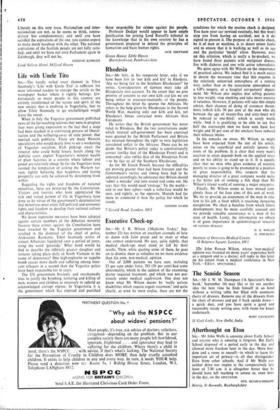Executive Check-up
SIR,—Mr J. R. Wilson ('Medicine Today,' Sep- tember 23) has written an excellent example of how to damn with faint praise and to sneer at what one cannot understand. He says, quite rightly, that medical check-ups must stand or fall by their results. Then, while quoting some of these, he goes on to dismiss them as valueless on no more evidence than his own, non-medical, opinion.
Out of 2,000 patients we have seen, including 23 per cent under forty. 783 (39 per cent) had some abnormality, which in the opinion of the examining doctor required treatment, and which was not pre- viously under medical supervision. One does not know what Mr Wilson means by 'really serious disabilities which require urgent treatment,' and quite clearly, as even he must realise, these are not the
conditions for which the routine check is designed. You have your car serviced routinely, but this won't stop you from having an accident, nor is it de- signed to prevent it. The purpose of a routine check, be it of man or machine, is to detect minor faults and to ensure that it is working as well as its age and the particular 'model' allow. However, even on this criterion, which is really a by-product, we have found three patients with malignant disease, five with diabetes and one with active tuberculosis.
We quite agree with Mr Wilson on the importance of practical advice. We indeed find it is much easier to devote the necessary time that this requires in the relatively unhurried atmosphere of a routine visit, rather than in the racecourse atmosphere of a GP's surgery, or a hospital out-patients' depart- ment. Mr Wilson also implies that telling patients to lose weight, stop smoking and take more exercise
valueless. However, if patients will take this simple advice, their chances of dying of coronary throm- bosis (which kills 30 per cent of the men who die between the age of twenty-five and sixty-four) will be reduced to one-third: which is surely worth while. And it is gratifying to be able to say that half the overweight men we have seen have lost weight and 30 per cent of the smokers have reduced their tobacco intake.
In his remarks on stress, Mr Wilson, as might have been expected from the rest of his article, seizes on the superficial and entirely ignores the roots of the problem. It is clear that every man's reaction to stress depends both on the applied stress and on his ability to stand up to ii It is equally clear that no man who gives evidence of reacting poorly to stress is going to be promoted to a position of great responsibility. One suspects that the managing director of a great corimany would make a far better job of running a fish shop than Mr Wilson's friend would of running a major enterprise.
Finally, Mr Wilson seems to have missed com- pletely three of the four aims of this sort of work. We try to provide an assessment of the man in rela- tion to his job, a facet which is receiving increasing recognition. We chart a baseline from which future developments may be more carefully assessed and we provide valuable reassurance to a man of his state of health. Lastly, the information we obtain is of great importance in epidemiological research on various diseases.
10 Belgrave Square, London, SW!
[Dr John Rowan Wilson, whose 'non-medical' opinion was founded on many years' experience both as a surgeon and as a doctor, will reply to this letter on his return from a medical conference in New York.—Editor. SPECTATOR.]


































 Previous page
Previous page